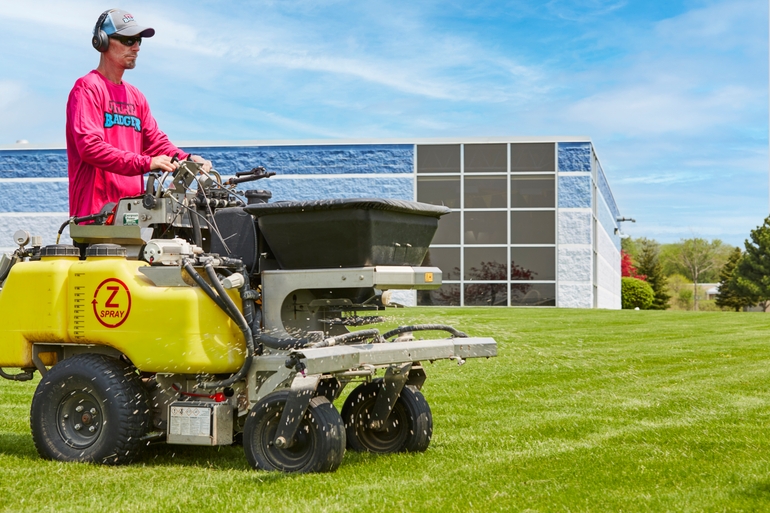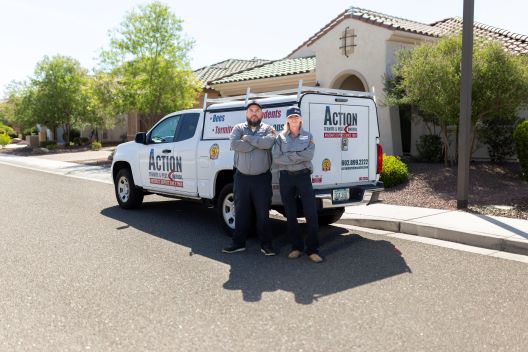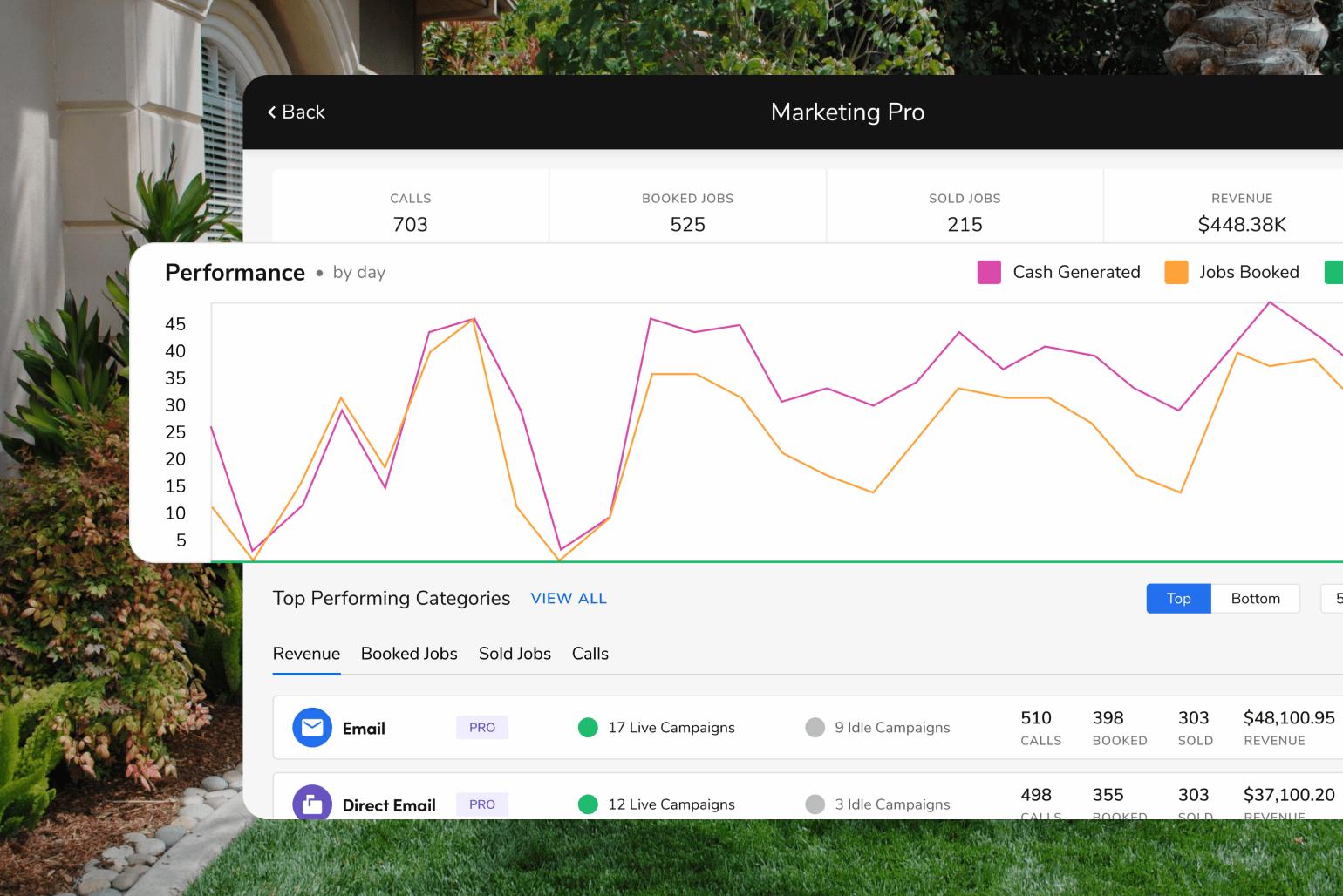How to Get Commercial Lawn Accounts

Commercial lawn accounts can be a great source of revenue for lawn care companies. Commercial properties and building owners typically have larger lawns than residential accounts. They’re often willing to pay more for professional lawn care services than homeowners.
On top of that, commercial clients often need routine lawn maintenance and landscaping services, meaning a steady stream of income. If you’re looking to grow your lawn care or landscaping business, targeting commercial accounts is a great option.
1. Research and Identify Target Market Opportunities
The better you understand your target market, the more success you’ll have closing new commercial lawn care contracts. Knowing your potential customers’ needs, wants, and constraints enables you to tailor your services to their businesses.
Tips for Conducting Market Research
There are several effective ways to conduct market research. Some good ones to start with include:
Analyzing local demographics: What types of businesses are in your service area? How big are they? Conduct a full demographic breakdown like this for all your potential customers.
Studying your competition: How many competitors do you have? What niches do they serve? What’s their branding like? This intel will help differentiate your brand and build an effective lawn service business plan.
Using online tools: Online tools such as Google Analytics and SEMrush can help you with market research, from tracking competitors’ online performance to understanding your target audience’s interests.
Once you understand the local commercial lawn care market, you can start identifying your best opportunities within it.
Tips for Identifying Market Niches
Some potentially profitable niches in lawn care and commercial landscaping contracts worth considering are:
Office buildings: Many office buildings have large lawns that need maintenance.
Retail stores: Retail stores need to maintain their exteriors to appeal to customers.
Restaurants: Restaurants must keep their landscaping clean and attractive, especially if they offer outdoor dining.
Schools: Clean, well-maintained school grounds create a safe and inviting student environment.
Hospitals: Hospitals need to keep their grounds clean and sanitary.
Successfully entering any niche depends on understanding customer pain points and tailoring your services accordingly. For example, if local businesses seem concerned about environmental impact, highlight your sustainable lawn care services, like using robotic mowers. Or if lots of businesses have flowerbeds, offer supporting services like seasonal fertilization to entice them into maintenance contracts.
2. Develop a Professional Portfolio and Case Studies
A portfolio and case studies are essential for commercial lawn care businesses that want to win new accounts. Both materials showcase your expertise, credibility, and successful projects.
Your portfolio should showcase photos, videos, and testimonials of your best commercial work. Case studies do the same but through narrative. They tell the story of what challenges you faced, what solutions you implemented, and what results you achieved when helping your customers.
Tips for Creating Portfolios
A visually appealing and easy-to-navigate professional portfolio will make the most impact on potential customers. Some easy-to-follow best practices:
Use a wide variety of high-quality photos and videos showcasing your best work.
Organize by client and project to help viewers navigate intuitively.
Include brief descriptions of each project, highlighting challenges and solutions.
Include testimonials as a form of social proof of your credibility.
Host on your website or an online portfolio platform that’s easy to share.
Tips for Writing Case Studies
As for case studies, follow this framework when writing one:
Name the client and the type of business they operate. For example: Yoknapatawpha County Hospital System.
Identify the challenges the customer faced. For example: Hospital leaders committed to green practices hired a commercial lawn care and landscaping company committed to sustainable practices.
Detail the solutions you implemented. For example: Lawn mowing rotations scheduled to minimize turf stress. Overseeding with grass better suited to native soil. Created a watering schedule for each hospital campus to follow.
Show the results achieved. For example: Hospital reduced pesticide and herbicide use by X% by switching to you. Data included in a major marketing campaign focusing on the hospital’s green initiatives.
Case studies should include high-quality images and testimonials. Produce new case studies regularly, and work in keywords where appropriate to help your lawn care SEO.
3. Network and Establish Strategic Partnerships
Referrals are one of the most valuable marketing leads, and networking is the best way to get them. Networking establishes and builds relationships with other business owners. That opens up the possibility of forming strategic partnerships with commercial real estate groups, property management companies, and other businesses with overlapping interests.
This mutually beneficial collaboration with complementary businesses expands your customer base in multiple ways:
Increased reach: If you partner with a real estate agency, they can recommend you as a lawn care company to their commercial clients.
Enhanced credibility: Your partner company’s reputation will rub off on you. Choose strategic partners with solid brand reputations. That way, potential clients will associate your business with a name they already trust.
Shared resources: Strategic partners should share marketing materials, staff, and equipment. That way, you can do things together that you couldn't do alone. That might mean doing something simple like a webinar together or something more extensive like a community event.
Those are the reasons to invest in networking. Here are some tips to help you network with confidence.
Tips for Networking and Building Relationships
There are many ways to network and establish business relationships that could become strategic partnerships. Great places to start include:
Join LinkedIn and find industry associations. This is a great way to connect with other lawn care and landscaping businesses.
Attend trade shows and industry events. Even residential events can lead to commercial lawn care account leads. For instance, having the right residential clients could mean introductions to their HOAs.
Participate in local events. Events such as chamber of commerce workshops are a great way to get your name out and meet potential clients.
As your relationships with other business owners progress, you can begin to identify which ones may be good strategic partners.
Tips for Approaching Potential Partners
Always be professional and respectful when approaching a potential partner. Remember to:
Introduce yourself and your business
Explain why you’re interested in partnering with them
Highlight the benefits of the partnership
Be ready to answer questions
Think of the potential cons and proactively address them in your pitch.
4. Implement Targeted Marketing and Advertising Campaigns
Targeted marketing and advertising campaigns increase your chances of getting noticed by new customers. That makes them essential digital marketing strategies for lawn care businesses that want more commercial account leads.
Targeted ads attract new clients through:
Increased visibility: Ads make your business seen by more people. As brand impressions stack up and awareness builds, your ads generate leads.
Personalized relevance: Target your ads to specific locations, demographics, and interests. This ensures that people who see your ads will likely be decision-makers interested in your lawn care services.
Trackable results: By tracking the results of your ad campaigns, you can spot opportunities for A/B tests and other optimizations to continually improve your ad effectiveness.
Tips for Targeting Commercial Lawn Care Ads
There are plenty of variables you could target with your ads. Several stand out as must-target to reach new commercial customers:
Location: Target your ads to businesses in your service areas. Think at the city, county, and state level.
Demographics: Segment your targeting to increase ad relevance and better understand ad data. This includes industry, ownership type, and whether it’s a large, medium, or small business.
Interests: Target your ads to businesses likely interested in lawn care services. Focus on businesses with lots of outdoor space, or are located in areas with lots of foot traffic.
A lawn care software platform like FieldRoutes, a ServiceTitan Company, helps you execute successful marketing and advertising campaigns. With the FieldRoutes® Marketing Suite, you can:
Create and manage your ads
Track your ad results
Optimize ad campaigns for better results
Paid advertising is just the beginning. From there, FieldRoutes covers everything from lawn care website design to reporting and analytics.
5. Offer Competitive and Customized Proposals
The most competitive proposal is the one best tailored to the specific lawn care needs of the potential client. Businesses want to know why hiring you will better support their profit margins than hiring a competing lawn care company.
That’s why you must submit competitive, customized proposals.
Tips for Creating Compelling Proposals
To create a compelling proposal, it’s important to:
Start by understanding the client's needs. Ask questions that help you understand who the client is as much as what work they need to be done. What are their specific lawn care requirements? What are their budget constraints? What are their core values?
Be clear and concise. Focus on being easy to read and understand. Highlight key elements, such as costs and budget breakdowns, so they’re easy to see.
Highlight your unique selling points. What makes your lawn care business different from the competition? The better you understand who the client is, the more you can highlight how your proposal aligns with their mission and values.
Accurately estimate project costs. Make sure your proposal is realistic and affordable. Ensure it acknowledges the client’s budgetary constraints and addresses any deviations or recommendations.
Address client concerns. What are the client's most significant pain points? How can you address them better than your competitors? Do they have any concerns about you?
Provide clear terms and conditions. Spell out the payment terms. Be clear on your cancellation policy. Setting clear expectations puts potential clients at ease.
Lawn care software like FieldRoutes simplifies the bid proposal process by automating much of it. For instance, FieldRoutes equips you with:
Customizable bid templates to quickly and easily create proposals
Bidding kits for quick, accurate estimating of large or complex jobs
Status tracking to help you get proposals to the finish line
FieldRoutes factors pricing margins and markups into estimates, too, to help you consistently drive revenue and profits from won contracts.
6. Provide Exceptional Customer Service and Build Long-Term Relationships
Exceptional customer service happens long before a business becomes your customer. Think of the promptness and professionalism of your follow-ups after a networking event.
Exceptional customer service keeps going after you win a customer, too. It fosters the long-term relationships needed to earn recurring business and expand commercial accounts. More long-term accounts mean more word-of-mouth referrals and clients who’ll negotiate with you more flexibly.
Tips for Delivering Excellent Customer Service
Commit to providing exceptional customer service, and these best practices will become second nature:
Respond promptly. Even if it’s to say you need more time to respond, always address customer inquiries and requests quickly.
Be punctual. A reliable schedule helps you be a trustworthy person. Showing up to appointments on time makes clients feel appreciated and prioritized.
Get to know every client. As both professionals and people. Genuine interactions make clients feel respected. They’ll be more likely to see you as someone who understands their needs.
Address problems proactively. Ideally, state how it has or will be solved. By finding and fixing issues instead of waiting for customers to come with complaints, they’ll see you as someone looking out for their best interests.
Price fairly. Being fair and equitable in pricing signals to customers that you’ll be fair throughout. Make sure your prices are competitive but fair.
Another way to deliver excellent customer service is by asking clients about their experience. You can then take that feedback to make process improvements that positively impact your commercial accounts.
Tips for Getting Customer Feedback and Addressing Concerns
There are several ways to ask customers for their feedback. Some of the most common include:
Direct feedback: Ask customers for feedback, either verbally or in writing
Surveys: Send a survey link to customers via email or messaging
Social media: Monitor social media for customer feedback, such as on forums
Call recordings: Listen to call recordings of customer feedback
Implementing improvements is a strong example of good customer service. It shows clients you value their feedback and are committed to a positive customer experience. Communicate with customers by acknowledging their concerns, then detailing the action taken to correct the issue and ensure it doesn’t happen again.
Let FieldRoutes Help
FieldRoutes lawn care software does more than give you command over your marketing and operations. It also gives you access to services designed to help grow your lawn care business, from content creation to local SEO optimization.
See how FieldRoutes can help you grow your business with a free demo.





